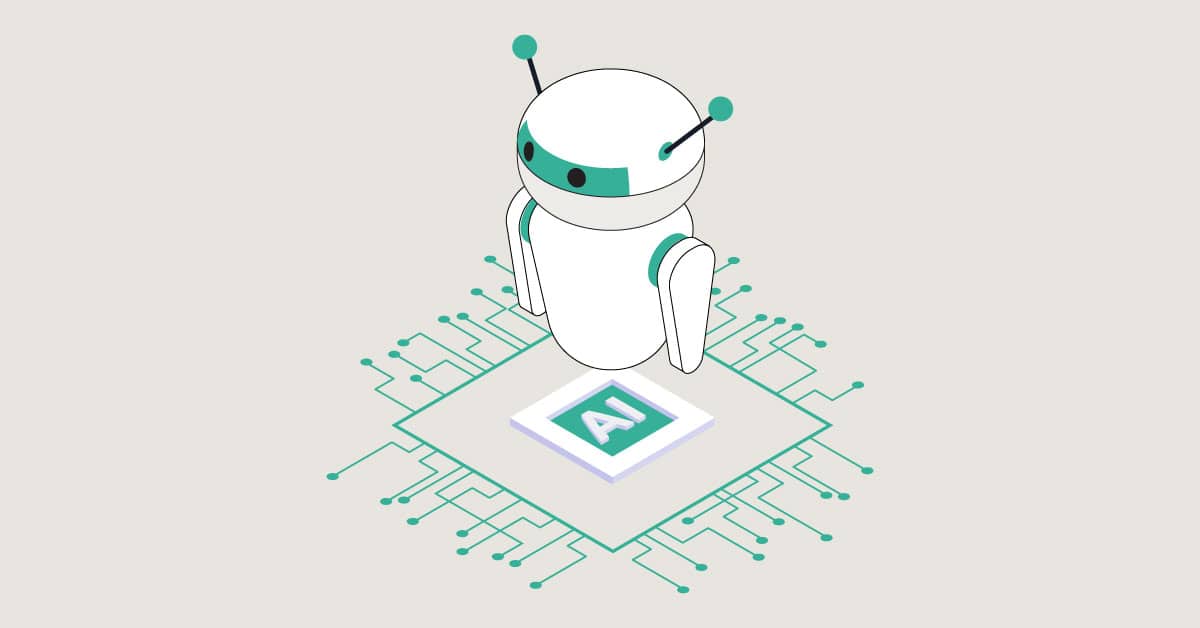Today’s variations of Artificial Intelligence (AI) represent the most advanced AI systems ever created by humans, prompting many legal professionals to question whether they should embrace the technology or avoid it altogether
According to the American Bar Association, rather than replacing lawyers, AI will likely continue assisting attorneys with their daily tasks. Still, many personal injury attorneys have concerns about how AI will impact their firms and other sectors of the legal profession.
This article touches on the history of AI, explores how AI presents itself in the legal profession and addresses the concerns some PI attorneys have about AI. The article’s last section discusses examples of how personal injury attorneys can use AI to elevate their practice.
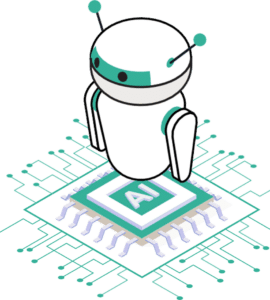
What is Artificial Intelligence (AI)?
Google defines artificial intelligence as a “set of technologies that enables computers to perform various advanced functions.” In other words, the computer uses programs, data, and other tools to perform more complex tasks.
For personal injury attorneys, this can mean anything from using AI to help in trial preparation and interrogatories, to automating document creation or even scheduling out your day.
Instead of simply telling people that two plus two equals four, for example, it can automatically detect the language in our document that talks about calculations. Using that clue, AI asks the user if they want to perform the calculations.
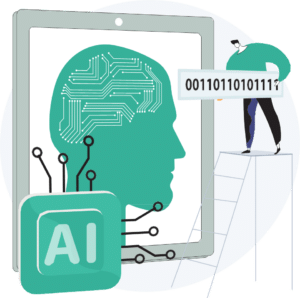
When AI first appeared
Alan Turing is considered the grandfather of artificial intelligence, as his work in 1935 theorized a type of computer that could generate ideas and responses based on stored information.
AI first appeared in practice at the University of Oxford in 1951 as a chess program created by Christopher Strachey, where users could play checkers against the computer.
A year after this program entered the scene, a machine- learning program called Shopper debuted.
In 1952, Arthur Samuel launched the first AI program in the United States, also a checkers game, for IBM. Throughout the decades that followed, computer scientists and mathematicians continued to build on the idea of machine learning and other tools to program computers to perform a variety of tasks.
Common examples of AI people use everyday
Despite the many concerns over AI, the fact is it permeates many aspects of our lives, and it has for quite some time. When music programs recommend what songs to listen to next or
compile playlists based on your interests, this is AI in action. Likewise, when professional networking programs or social media apps tell you about people you may know, this is AI.
AI is ubiquitous in today’s society, and few people can truly get through their days without interacting with AI in some form. However, AI does not necessarily look or sound the way that science fiction writers have described it in books and articles throughout history.
AI large language models
Recently, large language models like ChatGPT have taken center stage in the AI space, causing ripples and waves across a host of industries. At its core, ChatGPT is a program that uses data and statistical algorithms to generate
human-like text.
At first glance, ChatGPT’s answers to specific questions may give one the impression that it thought up content independently. In reality, it is programmed to create something that mimics what a human would most likely write based on the data it has access to (which numbers in the billions or more).
Proponents of ChatGPT tout its impressive ability to generate human-like text in response to complex queries in mere milliseconds. It can follow multi-step instructions with restrictions imposed on the answers it can give in less than a second. ChatGPT is a far cry from the original AI program, and many people in the legal industry are concerned about what happens next.
What is AI in legal tech?
Artificial intelligence seems to be everywhere, but you may not know how it presents itself in the legal industry, a profession long associated with pen and paper and tradition. AI is very much prominent in the legal sector, but it does not always call itself AI or seem threatening.
AI for law firms includes intuitive search functions, such as when a legal research program suggests possible cases based on what you put in the search bar before pressing “enter.” Other appearances of AI in the legal field are document templates and checking for negative treatment of a particular case.
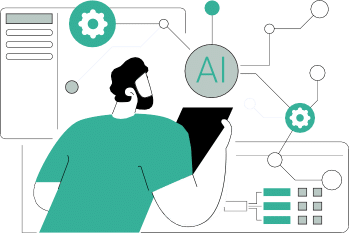
What are the concerns about AI in the legal industry?
Many professionals are concerned that with the dawn of ChatGPT and other tools, clients will turn to AI instead of turning to humans who went to school to help them. They are also concerned about clients using AI to draft legal documents or write demand letters.
Some fear potential clients will turn to AI for specific legal advice about their unique situation rather than talking to an attorney.
Others might harbor concerns about properly and securely using AI in their law firm. They may see the general value in using AI to streamline their practice but might not know where to begin or what that means.
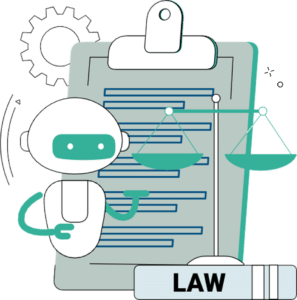
If AI is not new, what has changed?
AI is not new by any stretch of the imagination. So what has changed? One thing that is different is the ability of the current AI to mimic human text. However, ChatGPT and other large language models are not always entirely accurate regarding the information they provide or how they convey it.
But they represent the furthest advancement humans have made thus far in creating a computer that can mimic human text and thought. These types of AI programs are only going to improve as time goes on.
Are these valid concerns?
While it is still early in the game, it is safe to say that humans are still relevant, even in a world with ChatGPT. Despite ChatGPT’s wealth of data, its manner and method of communicating via static text is no match for the human intellect. Rather than replacing humans, AI stands to most likely do what it has done in the past – operate as an efficiency tool to augment and streamline what attorneys do on a daily basis.
Furthermore, large language models do not have the specific legal training that an attorney does. Instead, it merely has raw access to data, such as statutes, articles, document templates, and other pieces of information. Without having specific training in the law, AI cannot truly replace what a personal injury attorney provides a client when representing them in court or during settlement negotiations.
Most consumers understand this and will most likely still value an attorney’s work over the “quick-fix” solutions provided by online tools like ChatGPT.
In what direction is AI going?
With the progression of AI from the product of Turing’s imagination to a chess program to ChatGPT, it is safe to say that AI is rapidly progressing. At least, as of today, the future of AI is an increase in the accuracy of large language models or other iterations of similar programs.
But computer scientists are working diligently to find creative and effective ways to use AI to enhance the human experience in the world. After all, human mind and personal relationships between a client and their trial attorney will always be essential
What will AI be able to do in the future?
The sky is the limit with AI. Despite how impressive ChatGPT is to some, it is only the tip of the iceberg regarding how far large language models are likely to advance. What many find outstanding today will be obsolete tomorrow.
Microsoft is using ChatGPT’s large language model format to reimagine its Bing search engine. Instead of simply typing in a word or phrase and finding websites that discuss that
word or phrase, the new Bing empowers users to input multi- step queries. Other companies may seek to mimic this type of dynamic search usage or develop new ways to harness the power of AI.
What industries will AI impact going forward?
You would be hard-pressed to find an industry that will not feel the impacts of AI. Most enterprises already use AI, but the people in those professions may not know it. Law firms are certainly no exception.
Examples of AI’s impact on law firms
Artificial intelligence impacts personal injury law firms in many ways, such as streamlining their practice and allowing them to reach more clients with less human input. Here are examples of how AI is impacting law firms. You may be surprised that you already use these tools during an ordinary workday.
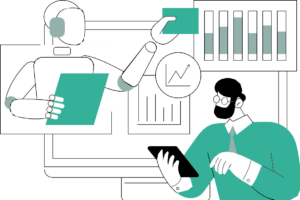
Document management and automation
PI attorneys, paralegals, secretaries, receptionists, and others interact with dozens, sometimes hundreds, of documents every day. They may write these documents from scratch, send them to clients or opposing counsel, read ones they receive from case parties, or file them with the court. But it is not a secret that a law firm runs on documents, whether in digital or paper form.
AI plays a big part in document management and automation, helping attorneys and their staff to be as efficient and effective as possible. AI accomplishes this by generating documents for law firms and categorizing and locating records in seconds.
Automatically generate documents
AI can automatically generate documents for personal injury attorneys by creating templates. First, the attorney chooses a standard item they or their staff routinely write and is relatively straightforward. Then they label the fields and match that up with data in a form, and in seconds, the AI generates a complete draft ready for editing.
CloudLex understands how challenging it can be to accomplish big projects if you and your team are stuck manually writing and editing documents, like fee agreements, routine letters, and other materials. That’s why we created an intuitive and seamless program for attorneys to develop pre-made templates and have the system fill in the information with the click of a button.
Categorize and locate documents
Categorizing, locating, and retrieving documents can be incredibly tedious, but if done right, it can save attorneys hours and hours of manual labor that keeps them from other projects.
AI can automatically detect the type of document something is by analyzing its tone or specific phrases. Instead of requiring you to manually search for the appropriate tag or type in a new label, it offers intuitive suggestions to cut the time in half.
Personal Injury case management software like CloudLex empowers you to quickly and accurately categorize and retrieve documents by using AI. Simply type in your natural-language query in the search bar, and the program looks at document names and within the records to find accurate and relevant search results.
Case prediction
Another area where AI can impact law firms is by helping attorneys predict the likelihood of successfully bringing a particular case to trial. AI can provide statistical analysis for a subtype of a personal injury case (like a medical malpractice case involving a certain medical device) or give you its prediction for a specific lawsuit.
AI accomplishes this by reviewing past outcomes and comparing the settlement negotiation progress in the current case to those of others.
Analyze past case outcomes
AI can analyze past outcomes in cases by broad type (e.g., personal injury or medical malpractice) or subtype, such as premises liability claims involving chain grocery stores. Personal injury attorneys can use this data to decide how to proceed or take on a different case. Instead of merely pouring all your efforts into a matter you hope is successful, you can get an idea from the outset about your odds of winning, thus helping you and your client properly garner the appropriate expectations.
CloudLex enables personal injury attorneys to generate powerful reports by client, case, firm, or firm member so the team can identify profitable and challenging areas. Rather than leaving it up to chance, attorneys can see the data in a convenient, comprehensive, user-friendly framework to help them make decisions and adjust operations as needed.
Track and calculate settlements
Tracking and calculating settlements is another area ripe for AI. Artificial Intelligence can help attorneys monitor the progress of settlement negotiations by the client, case type, or firmwide.
Valuable information like this allows attorneys and their teams to keep track of their deadlines and stay on top of live offers to avoid an unnecessary trial.
CloudLex goes further by leveraging AI to help attorneys calculate personal injury settlements. The program tracks and manages client expenses, medical bills, and other charges to help attorneys determine the appropriate settlement range for that client’s situation.
Rather than spending hours or days manually locating and calculating the settlement for a client, CloudLex takes care of this for you instantly.
Legal research
Many legal research programs use AI to help users search by suggesting cases or statute citations as they type in a query. AI also allows users to use natural language search queries rather than only searching for the document title they want to locate.
This allows personal injury attorneys to perform more robust searches to help them find relevant information to use to argue in their client’s favor.
AI also streamlines locating authorities that contradict, modify, or favorably treat the case or statute so you have this information before you go to court or settlement negotiations.
Automating repetitive and mundane tasks
If there is one place where computers belong and often excel, it is in automating routine tasks like data entry, data transfer, and computations. The power of AI is to streamline your practice by automating the expense-tracking and settlement process is endless. Furthermore, AI can automatically delegate tasks to users as people complete specific items to ensure everyone stays on track.
For example, when a client submits a contact form, AI can automatically send an intake sheet or appointment request link so the client can begin the onboarding process right away. Your team can send the fee agreement and engagement letter electronically, and when they sign the documents, AI automatically creates a new matter folder for that client.
Case management software programs like CloudLex use AI to streamline personal injury law firms’ operations so they can spend more time practicing law and less time doing paperwork or data entry. Our intuitive legal workflow management and one-click Intake to Matter generator simplify the process of moving clients through each stage in a case.
AI-enabled search tools
AI-enabled search tools put more information at your fingertips, making looking for and locating materials much easier. Instead of manually searching for documents or using restrictive formulas to find the information you need, many AI-enabled search tools allow you to search in an organic, user-friendly way.
CloudLex’s semantic search function uses natural language techniques, concept matching, and synonyms to give you more relevant results from your data. CloudLex also allows you to search across all parts of the software, such as calendar entries, client intakes, documents, notes, tasks, and matters. Within seconds, get the accurate results you need to complete your projects.
CloudLex is leveraging AI to help personal injury attorneys prosper
In this time of technological advancements, many attorneys may harbor the concern that AI is slowly substituting the critical legal work they do on a daily basis. At CloudLex, we genuinely believe attorneys cannot be replaced.
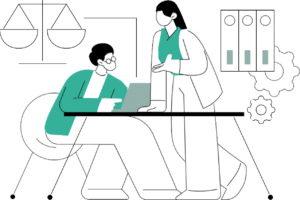
We understand and are here to support your dedication to helping your clients secure compensation for their injuries. That is why we are leveraging AI to help enhance and streamline the good work personal injury attorneys do. Contact our team today to learn more about what we can do for your law firm.
